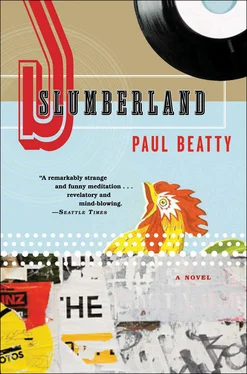Paul Beatty - Slumberland
Здесь есть возможность читать онлайн «Paul Beatty - Slumberland» весь текст электронной книги совершенно бесплатно (целиком полную версию без сокращений). В некоторых случаях можно слушать аудио, скачать через торрент в формате fb2 и присутствует краткое содержание. Год выпуска: 2009, Издательство: Bloomsbury USA, Жанр: Современная проза, на английском языке. Описание произведения, (предисловие) а так же отзывы посетителей доступны на портале библиотеки ЛибКат.
- Название:Slumberland
- Автор:
- Издательство:Bloomsbury USA
- Жанр:
- Год:2009
- ISBN:нет данных
- Рейтинг книги:4 / 5. Голосов: 1
-
Избранное:Добавить в избранное
- Отзывы:
-
Ваша оценка:
- 80
- 1
- 2
- 3
- 4
- 5
Slumberland: краткое содержание, описание и аннотация
Предлагаем к чтению аннотацию, описание, краткое содержание или предисловие (зависит от того, что написал сам автор книги «Slumberland»). Если вы не нашли необходимую информацию о книге — напишите в комментариях, мы постараемся отыскать её.
is laugh-out-loud funny and its wit and satire can be burning…There are incredible moments of tenderness…Beatty is a kind of symphonic W. E. B. Du Bois.”—
Ferocious, bombastic, and hilarious,
is vintage Paul Beatty and belongs on the shelf next to Jonathan Lethem, Colson Whitehead, and Junot Diaz. In this widely praised novel of race, identity, and underground music, DJ Darky has created the perfect beat. Now, he must seek out Charles Stone, a little known avant-garde jazzman, who can help bring his sonic masterpiece to fruition.
Slumberland — читать онлайн бесплатно полную книгу (весь текст) целиком
Ниже представлен текст книги, разбитый по страницам. Система сохранения места последней прочитанной страницы, позволяет с удобством читать онлайн бесплатно книгу «Slumberland», без необходимости каждый раз заново искать на чём Вы остановились. Поставьте закладку, и сможете в любой момент перейти на страницу, на которой закончили чтение.
Интервал:
Закладка:
The proctor walked up and down the aisles, placing a mechanical pencil and a sealed test booklet on each desk.
“If you find yourself in this classroom, it means that you’ve scored in the ninety-eighth percentile on the Tennessee Mathematical Proficiency Test for Non-Asian Eighth Graders. This booklet I’m placing in front of you is the Math Skills Assessment measure given to all incoming freshman math majors here at the University of California at Los Angeles. Do not open the booklet until you are told.”
A nervous cough. From below, on the quad, the sounds of a coed touch football game. I leaned forward and asked Uukkarnit what his name meant. Without looking back he answered, “If you shave the polar bear, you’ll find his skin is black.”
“Is that true?”
“The meaning of the name or the shit about the black skin?”
“Both.”
“The former is true; as for the latter, I’ve never been north of Santa Barbara, much less seen a shaved fucking polar bear.”
The scores were posted outside the classroom in descending order. It was the first computer printout I’d ever seen. There was something affirming about seeing my name and score — FERGUSON W. SOWELL: 100/100—at the top of the list in what was then a futuristic telex font. I felt official. I was real. One by one we were summoned to a small office. When my turn came, the man behind the desk launched into a rapid-fire spiel about the Cold War and “finding suitable candidates for training in the aeronautical and nuclear sciences.” When he said “suitable,” he slowed down, finally stopping altogether mid — sales pitch. My inherent unsuitability having dawned on him, he had nothing more to say to me other than, “You may keep the mechanical pencil.”
The white students were placed in an advanced mathematics class at the university; we Negro boys, and the lone girl, were given instruments and sent to the Wilmer Jessop Academy of Music. I never saw Uukkarnit again.
I won’t say I didn’t learn anything at Jessop Academy, but they never taught Why? Why was I playing? Why was music so powerful? What can I do with music? Can it heal? Can it kill? They never taught me who Wilmer Jessop was, either, now that I think about it. I learned more about music from watching Spencer Tracy on Turner Classic Movies than from any composition class. Pick a movie, any movie— Boys Town, Bad Day at Black Rock —when Spencer Tracy enters a room, he stares hard at the floor, looking for his acting mark. He ambles up to it, squints at it, jabs his toe at it, casually places his hands on his hips, lifts that broad beatific face of his, then acts his motherfucking ass off. I tried to teach myself to play like Spencer Tracy acts. Incorporating “looking for my mark” into my trumpet solos, playing with the knowledge that the search for identity and a sense of place is both process and result, and the trick is to fool the audience into thinking you know exactly where you’re going. That math test score was the first time I spotted my mark on the stage. I knew where to stand. I existed, and would go on to further differentiate myself from the rest of black maledom with an SAT math score that to this day I carry in my back pocket, so when anyone asks for my papers I can show them my test results and declare, “I don’t know what other nigger did what to whom, but it couldn’t be me. Look, 800 Math.”
Back then I harbored dreams of being the insouciant jazzman, figuring my given name, Ferguson W. Sowell, guaranteed that in a few years my pipe-smoking visage would be on the cover of a string of eponymous Blue Note albums. I had a desk drawer stuffed with scraps of paper bearing these unreleased titles: Sowell Brother, Sowell Survivor, O Sowell Mio, Sowell’d Out, Summer Sowellstice . I did have some talent; my phonographic memory allowed me to replicate any piece of music perfectly. But I never knew what I was playing. No matter how many times my music teacher reminded me that the tunes sounded like their titles, I couldn’t tell one Thelonious Monk composition from another.
“ Bum baba bum. Bum baba bum, ” he’d scat. “Bum ba bum ba bum bababa bum . What song is that, Mr. Sowell?”
“ ‘Epistrophy’?”
“ ‘Blue Monk,’ you tone-deaf ignoramus!”
I was “phased out” of the jazz program at Jessop Academy and became the only student enrolled in “Audiovisual Studies,” the music-school equivalent of special education. I spent most of my time preparing for a future career as a roadie by setting up drum sets, tuning instruments, and wheeling projectors and sound equipment from classroom to classroom. During my free time I locked myself in the storeroom and fucked around with the computers and the turntables. For graduation I was expected to hand in a thesis paper explaining how to properly mic up a drummer who sings background vocals, but instead handed in a version of Handel’s Messiah composed entirely of elements from the Beastie Boys’ Licensed to Ill album. My baroque/brat-rap/mash-up oratorio became that year’s valedictorian speech. After graduation I decided to give up the trumpet, enroll in junior college, and become a DJ.
DJing was so much easier. Too easy, really. Play “Knee Deep” at the wedding reception and even the groom’s grandmother would ease out onto the dance floor to shake her brittle hips and swing her pendulous tits.
Look, I’ll be the first to admit it, I’m not the most technically gifted disc jockey ever to put needle to wax. Acute left-handedness, a fear of crowds, and what I consider to be my healthy hatred of self make for a catchy stage name, DJ Darky — That Right-Brained, Self-Absorbed Agoraphobic Boy, and not your prototypical beat-juggling, speed-mixing, whirling dervish yelling, “Art form! Art form!” after every body contortion and scratch. Much of what little scratching I do is accidental, so I compensate for a lack of skills and Negritude with a surfeit of good taste and a record collection that I like to think is to DJing what the Louvre is to painting.
I envy the Louvre’s curator. Whoever it is, they have it better than I do. No beating the bushes for the next impressionistic phenom. There’s this kid Monet you have to see. His brushwork is impeccable . No flipping through portfolios, listening to mix tapes, hoping your heavy sigh conveys intrigue, not exasperation. No one ever asks what you think about Jeff Koons. Twice a year the curator takes a slow, temperature-controlled elevator ride to the basement, greets the armed Algerian guard in the burgundy polyester blazer with a patronizing wave, and asks him to pick a letter, any letter, and blows the dust off the Degas and the Delacroix. We’ll show theez onez, no?
All the important decisions were made for him back in 1793 when the Louvre opened its gilded doors and said, Enculez le chic , fuck cool. At the end of the eighteenth century, neoclassicism was pop culture. Goya was a graffiti artist. Lithography was computer graphics. Mozart rocked the house sporting a Suzy-Q hair perm that’d make any time-traveling L.A. gangster rapper worth his curling iron and shower cap ask where he could cop one of them wigs, sans the powder? When Zerezo transformed the bolero, a Spanish folk dance, into French ballet, he might as well have been Crazy Legs or Rock Steady teaching break dancing to the urban doyennes, their hair in buns and their other buns in the air.
… and roller-skate, roller-skate. . and demi-plié, demi-plié .
I’ve never seen the Mona Lisa, and from what I hear it’s over-rated. But what isn’t? Da Vinci got lucky. Every genius does, especially the prolific ones. I feel the same way about Leonardo as I do about Tupac and Edgar Allan Poe. Two composers whose baggy-eyed, drug-induced prolificacy, in much the same way the millionth monkey on the millionth typewriter types Shakespeare, resulted in a few random pieces of brilliance among reams of rhyming, repetitious, woe-is-me claptrap. “The Raven,” “How Do U Want It?” “The Tell-Tale Heart,” “Dear Mama,” “California Love,”—each is a masterpiece, but when’s the last time a prep school taskmaster called upon a cardigan sweater for a recitation of “Tamerlane,” “To F — s S. O—–d” or “The Conqueror Worm”? And on that most sacred of holidays, Tupac’s birthday, every urban-contemporary radio station in the world knows not to play “Honk If U Luv Honkies,” “Thugs, Slugs and Butt Plugs,” and “Real Niggaz Get Manicures.” To me the Mona Lisa is little more than a Renaissance Playboy centerfold. Blemishes and Mediterranean hirsuteness airbrushed out, she has been retouched to the point of meaningless perfection. However, I understand the painting’s value: the allure of a piece of art that not everyone adores, but that no one hates. My record collection lacked a Mona Lisa, an apolitical, simple yet subtly complex piece of music that no one could dismiss. A beat that when you hear it at a party makes you think you’re special even though you’re dressed, speaking, drinking, dancing, and thinking exactly like everyone else. This beat that spoke directly to you and no one else. Telling you in no uncertain terms that you’re alive.
Читать дальшеИнтервал:
Закладка:
Похожие книги на «Slumberland»
Представляем Вашему вниманию похожие книги на «Slumberland» списком для выбора. Мы отобрали схожую по названию и смыслу литературу в надежде предоставить читателям больше вариантов отыскать новые, интересные, ещё непрочитанные произведения.
Обсуждение, отзывы о книге «Slumberland» и просто собственные мнения читателей. Оставьте ваши комментарии, напишите, что Вы думаете о произведении, его смысле или главных героях. Укажите что конкретно понравилось, а что нет, и почему Вы так считаете.












